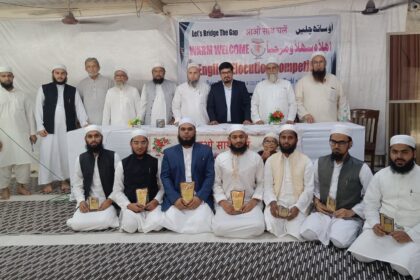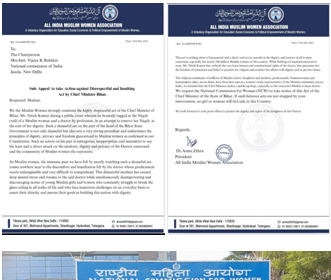I’tikaf: A Spiritual Ascent Beyond Mere Worship
Mohammad Taukir Rahmani
EC Exclusive
I’tikaf is not merely an act of worship; it is a profound spiritual journey—a sacred retreat where one secludes himself from worldly distractions and surrenders entirely at the doorstep of his Lord. It is a conscious shift of focus from the fleeting illusions of life to the Eternal Being, the very essence of existence and the foundation of all realities. This solitude is not just a physical withdrawal but an inner voyage that cleanses the heart and soul, drawing one closer to Allah. It is through this devotion that a person cultivates angelic attributes, rising above worldly desires and transforming into a refined soul—one whose essence melts in prostration and whose eyes find solace in tears shed in divine remembrance.
I’tikaf is a deeply transformative experience that liberates the soul from the darkness of sin and immerses it in the radiant glow of divine mercy. It is a period of sacred wakefulness, where one remains in pursuit of Laylatul Qadr, the Night of Decree, hoping to receive the boundless grace of Allah. When a person withdraws from worldly affairs and dedicates himself to I’tikaf, a newfound spirituality awakens within him. His heart begins to savor the sweetness of worship, just as one relishes his most beloved sustenance. Worship, after all, is the nourishment of the soul, and when it is performed with sincerity and excellence, it elevates a person above material impurities, granting him the honor of true servitude. At this stage, the allure of worldly glitters fades into insignificance, and the doors to the reality of life begin to open before him.
The Virtue of I’tikaf: Not Limited to Ramadan
The blessings of I’tikaf are not confined to Ramadan; rather, this spiritual practice can be observed at any time of the year. However, the sacred atmosphere of Ramadan provides the ideal setting, as its unique blessings and heightened spirituality make it easier for one to devote himself entirely to worship. The Messenger of Allah ﷺ regularly observed I’tikaf during Ramadan, particularly in its last ten days, encouraging the pious among his Ummah to follow this Sunnah.

Even those unable to dedicate a fixed period for I’tikaf can still earn its rewards. Simply by making the intention of I’tikaf whenever they enter the masjid, they can partake in its blessings while fulfilling their acts of devotion. In truth, I’tikaf is not merely for those who perform routine acts of worship—it is for the select individuals who seek to ascend the highest levels of servitude and spiritual closeness to Allah.
The Legal Boundaries and Essential Conditions of I’tikaf
It is narrated from Ummul Mu’mineen Aisha (RA) that: “A person observing I’tikaf should neither visit a sick person nor attend a funeral. He should not engage in intimacy with his wife, nor kiss or embrace her. He should not leave the mosque for any personal need except for those unavoidable necessities that must be fulfilled (such as purification, ablution, or bathing). Fasting is a condition for I’tikaf in Ramadan, and men should observe I’tikaf in a mosque where congregational prayers are held.”
(Sunan Abu Dawood: 2473, Sunan Ibn Majah: 1775)
These conditions serve a higher purpose—they ensure that the devotee remains entirely engrossed in worship, enduring spiritual discipline, and breaking free from worldly distractions. Through this intense devotion, he reaches an exalted state of servitude where his entire being is consumed in the remembrance of Allah.
I’tikaf for Women and Its Designated Place
It is essential to recognize that I’tikaf is not restricted to men; it is also prescribed for women, as evidenced by the practices of the noble wives of the Prophet ﷺ.
“The Prophet ﷺ used to observe I’tikaf during the last ten days of Ramadan until he passed away. After him, his noble wives also observed I’tikaf.”
(Sahih al-Bukhari: 2026, Sahih Muslim: 1172)
According to Islamic jurisprudents, the preferable place for women to observe I’tikaf is within their designated prayer area (musalla) at home. This practice ensures that they uphold the principles of modesty, chastity, and privacy while still reaping the immense spiritual benefits of I’tikaf.
“Aisha, Hafsa, and Zainab (RA) had set up tents in the mosque to observe I’tikaf during the time of the Prophet ﷺ. However, later, the Prophet ﷺ did not approve of this practice due to the potential risk of fitnah (trial or mischief).”
(Sahih al-Bukhari: 2033)
This highlights the importance of maintaining both spiritual devotion and social harmony when engaging in acts of worship.
I’tikaf: A Timeless Path to Spiritual Discipline and Inner Peace
I’tikaf is not a mere ritual; it is an enduring means of spiritual refinement and inner tranquility. It is a sacred interval where one severs ties with the ephemeral world and reconnects with his true essence—experiencing a divine sweetness in worship that is unparalleled. It is in these moments of seclusion that the soul is cleansed, much like the earth is purified and rejuvenated after rainfall. This profound act of devotion elevates a person beyond worldly distractions, adorning him with angelic qualities and immersing him in the boundless ocean of divine knowledge and recognition.
More than just an act of worship, I’tikaf serves as an invitation to deep reflection. It reminds us that the true beauty of existence and the ultimate joy of life lie not in worldly possessions but in the worship of the Creator and the pursuit of His nearness. If one truly seeks to connect with Allah, let him retreat into I’tikaf, weep in His presence, relinquish his worldly desires in pursuit of divine pleasure, and embrace in those sacred moments a bliss that even a lifetime of deeds may not bestow.














